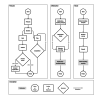Enhancing Mental Health and Medication Adherence Among Men Who Have Sex With Men Recently Diagnosed With HIV With a Dialectical Behavior Therapy-Informed Intervention Incorporating mHealth, Online Skills Training, and Phone Coaching: Development Study Using Human-Centered Design Approach
- PMID: 37831497
- PMCID: PMC10611999
- DOI: 10.2196/47903
Enhancing Mental Health and Medication Adherence Among Men Who Have Sex With Men Recently Diagnosed With HIV With a Dialectical Behavior Therapy-Informed Intervention Incorporating mHealth, Online Skills Training, and Phone Coaching: Development Study Using Human-Centered Design Approach
Abstract
Background: Mental health problems are common among men who have sex with men (MSM) living with HIV and may negatively affect medication adherence. Psychosocial interventions designed to address these urgent needs are scarce in China. Incorporating behavioral health theories into intervention development strengthens the effectiveness of these interventions. The absence of a robust theoretical basis for interventions may also present challenges to identify active intervention ingredients.
Objective: This study aims to systematically describe the development of a mobile health-based intervention for MSM recently diagnosed with HIV in China, including the theoretical basis for the content and the considerations for its technological delivery.
Methods: We used intervention mapping (IM) to guide overall intervention development, a behavioral intervention technology model for technological delivery design, and a human-centered design and cultural adaptation model for intervention tailoring throughout all steps of IM.
Results: The dialectical behavior therapy (DBT)-informed intervention, Turning to Sunshine, comprised 3 components: app-based individual skills learning, group-based skills training, and on-demand phone coaching. The theoretical basis for the intervention content is based on the DBT model of emotions, which fits our conceptualization of the intervention user's mental health needs. The intervention aims to help MSM recently diagnosed with HIV (1) survive moments of high emotional intensity and strong action urges, (2) change emotional expression to regulate emotions, and (3) reduce emotional vulnerability, as well as (4) augment community resources for mental health services. Technological delivery considerations included rationale of the medium, complexity, and esthetics of information delivery; data logs; data visualization; notifications; and passive data collection.
Conclusions: This study laid out the steps for the development of a DBT-informed mobile health intervention that integrated app-based individual learning, group-based skills training, and phone coaching. This intervention, Turning to Sunshine, aims to improve mental health outcomes for MSM newly diagnosed with HIV in China. The IM framework informed by human-centered design principles and cultural adaptation considerations offered a systematic approach to develop the current intervention and tailor it to the target intervention users. The behavioral intervention technology model facilitated the translation of behavioral intervention strategies into technological delivery components. The systematic development and reporting of the current intervention can serve as a guide for similar intervention studies. The content of the current intervention could be adapted for a broader population with similar emotional struggles to improve their mental health outcomes.
Keywords: DBT; MSM; coping skill training; cultural adaptation; dialectical behavior therapy; intervention mapping; men who have sex with men; participatory approach.
©Liying Wang, Weichao Yuwen, Wenzhe Hua, Lingxiao Chen, Vibh Forsythe Cox, Huang Zheng, Zhen Ning, Zhuojun Zhao, Zhaoyu Liu, Yunzhang Jiang, Xinran Li, Yawen Guo, Jane M Simoni. Originally published in JMIR Formative Research (https://formative.jmir.org), 13.10.2023.
Conflict of interest statement
Conflicts of Interest: None declared.
Figures
References
-
- Global HIV and AIDS statistics — fact sheet. Joint United Nations Programme on HIV/AIDS. [2023-05-04]. https://www.unaids.org/en/resources/fact-sheet#:~:text=Global%20HIV%20st... .
-
- Chen F, Cai C, Wang S, Qin Q, Jin Y, Li D, Ge L, Li P, Cui Y, Tang H, Lv F. Trends in suicide mortality among people with HIV after diagnosis during 2012-18: a retrospective, national cohort study in China. Lancet HIV. 2022 Feb;9(2):e102–11. doi: 10.1016/S2352-3018(21)00316-7. http://paperpile.com/b/lvqG7m/FGYMf S2352-3018(21)00316-7 - DOI - PubMed
-
- Sun S, Pachankis JE, Li X, Operario D. Addressing minority stress and mental health among men who have sex with men (MSM) in China. Curr HIV/AIDS Rep. 2020 Feb;17(1):35–62. doi: 10.1007/s11904-019-00479-w. https://europepmc.org/abstract/MED/31950336 10.1007/s11904-019-00479-w - DOI - PMC - PubMed
-
- Zhao Y, Li Z, Sheng Y. Timely linkage to care among men who have sex with men newly diagnosed with HIV: a structural equation model adapted from the HIV-related stigma framework. Nurs Health Sci. 2022 Sep;24(3):643–51. doi: 10.1111/nhs.12960. http://paperpile.com/b/lvqG7m/xq67 - DOI - PubMed
-
- Zhang X, Lewis S, Chen X, Berry N, Bucci S. Mental health professionals views and the impact of COVID-19 pandemic on implementing digital mental health in China: a nationwide survey study. Internet Interv. 2022 Sep 24;30:100576. doi: 10.1016/j.invent.2022.100576. https://linkinghub.elsevier.com/retrieve/pii/S2214-7829(22)00083-5 S2214-7829(22)00083-5 - DOI - PMC - PubMed
Grants and funding
LinkOut - more resources
Full Text Sources



